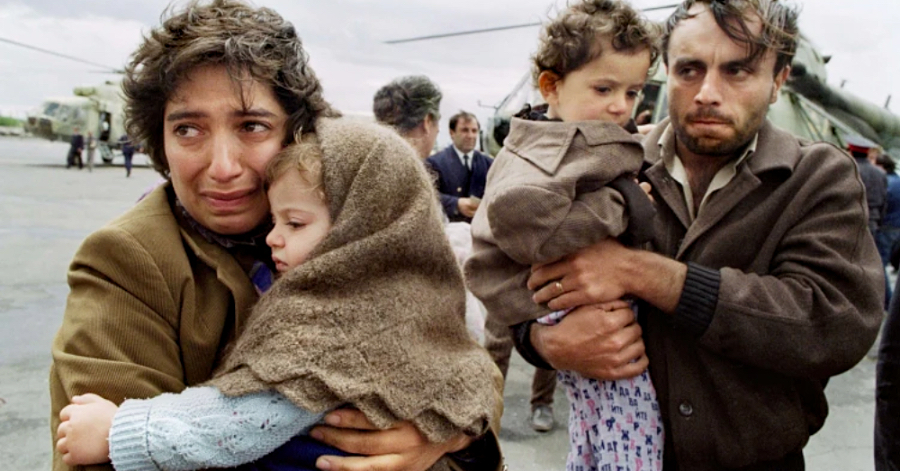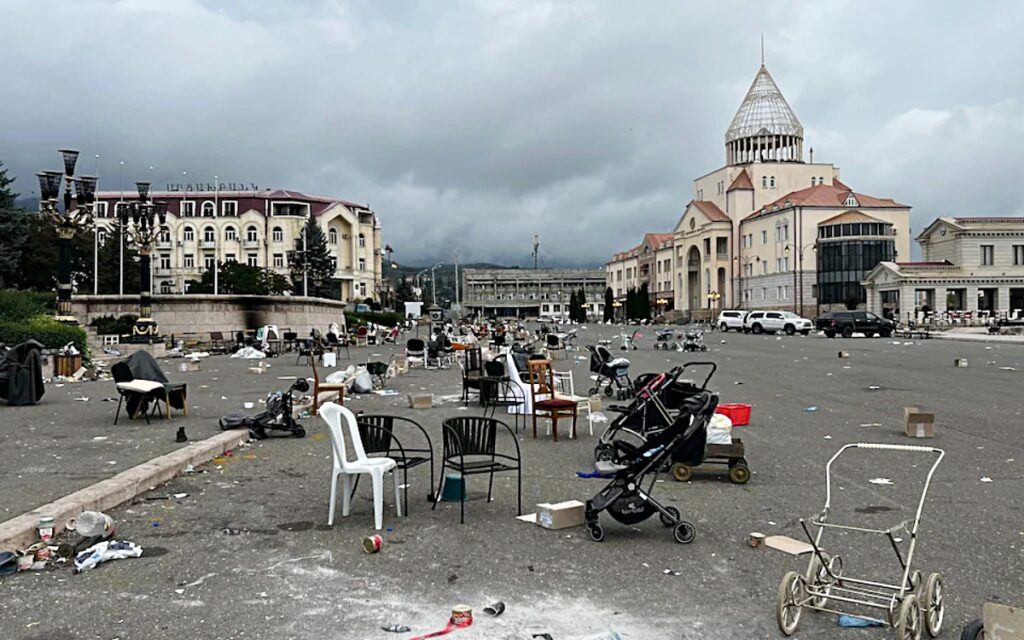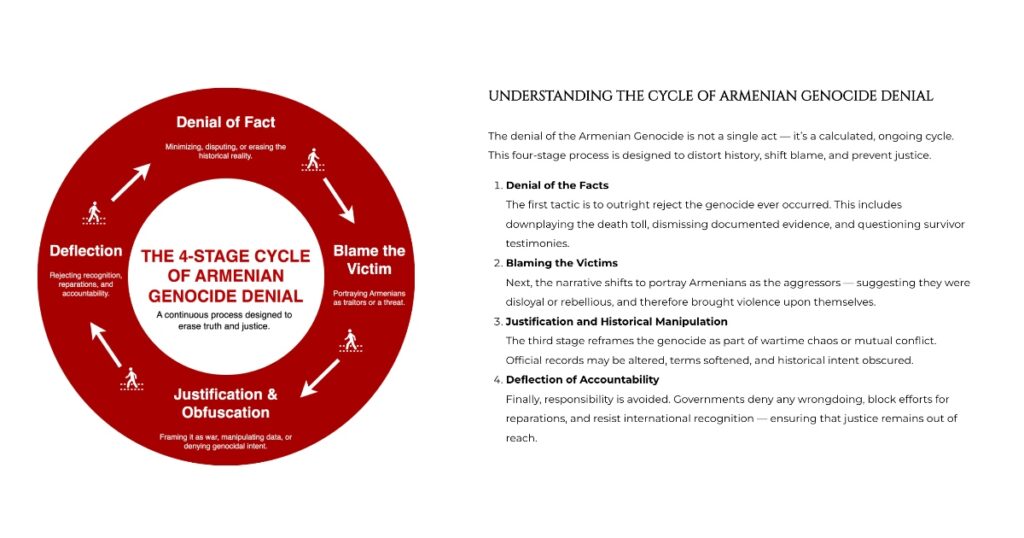For over a hundred years, Armenians scattered across the globe have carried an unshakable mission: to speak for those silenced by genocide and to demand justice when the world looks away. That same determination now fuels the fight to hold Azerbaijan’s leadership accountable for the destruction of Artsakh (Nagorno-Karabakh) and the forced displacement of its 120,000 indigenous people, living on their 3,000-year-old ancestral lands as the world’s first Christian nation. From the courtrooms of The Hague to the quiet but relentless work of gathering evidence in exile, the Armenian Diaspora is proving that history’s wounds do not fade — they ignite a will to act.
Even as official diplomacy cools and leaders sign peace agreements, a different kind of battle is being waged far from political chambers. Armenian Diaspora communities worldwide are quietly but relentlessly building cases against Azerbaijan’s leadership for war crimes, ethnic cleansing, and genocide. Their mission is clear: to ensure that the atrocities committed against the Armenians of Artsakh are not buried under the weight of geopolitical deals.
The Strategic Stand-In — Why the Diaspora Matters Now
Since the fall of Nagorno-Karabakh, Armenia’s government under Prime Minister Nikol Pashinyan has signaled a pivot toward diplomacy, often avoiding direct legal escalation with Baku. But the Diaspora operates without those constraints. From Los Angeles to Paris, Brussels to Buenos Aires, Armenian legal teams, advocacy groups, and grassroots organizations are pressing forward in international courts, ensuring that justice remains on the global agenda even if Yerevan steps back.
Current Legal Momentum
At the ICC (International Criminal Court):
The U.S.-based Center for Truth and Justice (CFTJ) filed a detailed submission in April 2024 urging the ICC to open a preliminary investigation into genocide charges against Azerbaijani President Ilham Aliyev and other senior officials. This included over 500 survivor testimonies and more than 1,500 pieces of documented evidence. In September 2024, the first victim-led filing reached the court, representing displaced Artsakh Armenians and calling for prosecution over forced displacement and cultural eradication.
At the ICJ (International Court of Justice):
Armenia initiated proceedings against Azerbaijan under the International Convention on the Elimination of All Forms of Racial Discrimination. While this case has already produced provisional measures against Baku, there is concern it could be dropped or softened as part of peace negotiations. The Diaspora sees this as a call to action, not a cue to stop.
At the ECHR (European Court of Human Rights):
Individual Armenians, supported by Diaspora lawyers, are bringing human rights claims directly against Azerbaijan. These cases proceed independently of Armenia’s government and keep the issue alive in European legal forums.
Diaspora Organizations Driving the Effort
Several groups are already playing a decisive role:
• Center for Truth and Justice (CFTJ) — spearheading ICC filings and evidence collection.
• Zimeray & Finelle Law Firm — working alongside the Tufenkian Foundation and Association de soutien à l’Artsakh to represent victims before the ICC.
• European Armenian Federation for Justice and Democracy (EAFJD) — lobbying in Brussels and within EU institutions to maintain pressure on Azerbaijan.
• Grassroots initiatives like Hayaqve, mobilizing petitions and public action to keep genocide recognition central to Armenian identity and justice campaigns.
Why This Works Without Armenia’s Direct Involvement
By pursuing cases through international courts, the Armenian Diaspora bypasses the diplomatic limitations of a small state navigating survival and foreign pressure. Far from a small grassroots effort, it is a coordinated global force — uniting lawyers, activists, and allies across continents. They are forging coalitions with Yazidi, Kurdish, and Rohingya advocates to strengthen the legal and moral case, while mounting high-visibility campaigns that challenge Azerbaijan’s image on the world stage — from protests at Formula 1 events to organized opposition against hosting COP29 in Baku — ensuring that no “business-as-usual” narrative can take hold.
Lessons From History
History offers proof that diaspora-led campaigns can move mountains. South African apartheid fell under immense international pressure long before the state conceded reform. Syrian war crimes cases advanced in European courts despite Damascus’ total refusal to cooperate. The Rohingya genocide case at the ICC gained momentum through refugee-driven legal filings. In each example, state inaction did not halt the pursuit of justice.
A Movement That Won’t Let Go
The Armenian Diaspora is proving that even when borders and politics shift, the pursuit of justice for genocide can endure. For over a century, they have carried the torch for recognition and justice for the Armenian Genocide, refusing to let truth be buried by time or politics. This is not a short campaign but a generational mission. Whether it takes years or decades, these communities are committed to making sure Ilham Aliyev and those responsible for the destruction of Artsakh — from the beheadings of Armenian prisoners, to the mutilation of women, to the use of illegal cluster munitions supplied by Israel against civilian areas — face international accountability.
The courtrooms may be far from Stepanakert, but the voices of its exiled people echo there — carried by a Diaspora that refuses to forget, refuses to forgive without justice, and refuses to let the crime of genocide be erased.
The Armenian Genocide Museum of Canada (AGMC) in Toronto, Ontario is the country’s only museum dedicated solely to commemorating the Armenian Genocide. A non-profit institution, it focuses on education, historical truth, and community engagement, telling the story of survival and resilience across generations, with a particular emphasis on elevating women’s experiences, voices, and contributions during and after the Genocide. Originally founded in a private home, the museum is now expanding into a larger space to preserve and share this vital history, while continuing to support grassroots initiatives that keep memory and justice alive.



